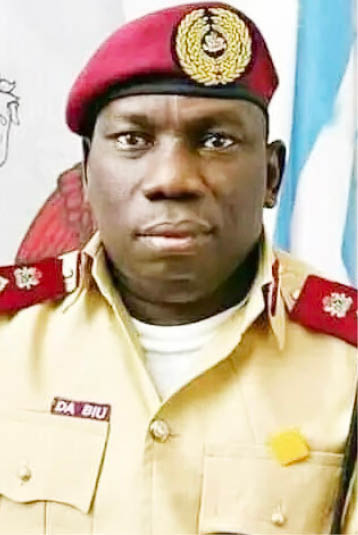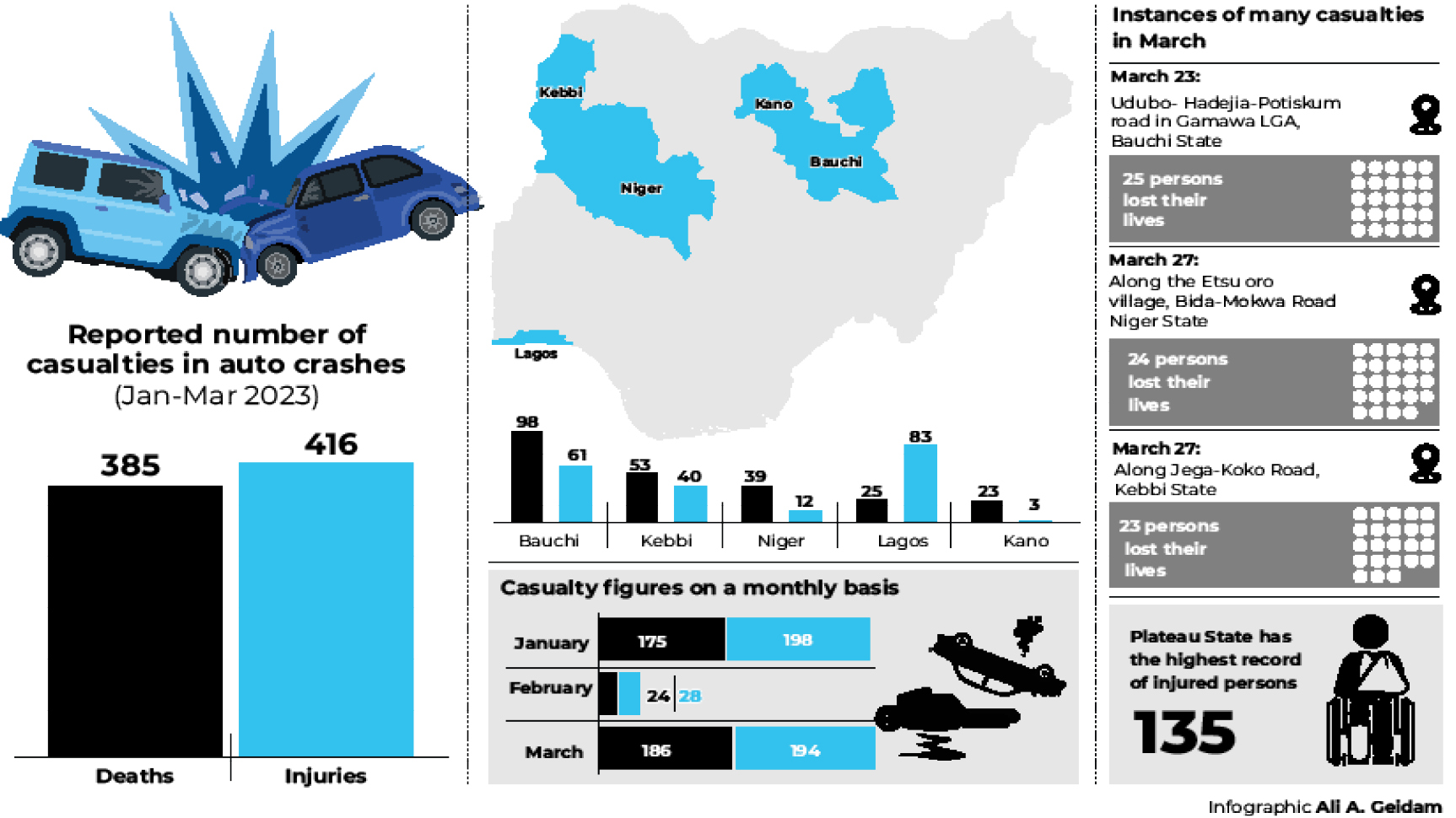No fewer than 385 people have died and 416 have sustained injuries as a result of auto crashes in the past three months, Daily Trust findings revealed.
The casualty figure was based on reported cases of road accidents from January to March this year, as published by this newspaper.
Overspeeding, overloading and some unacceptable attitudes of drivers have been identified by the Federal Road Safety Corps (FRSC) as the causes of the rising rate of auto crashes in the country.
Efforts to get an official figure of road crashes within the period failed, as the FRSC spokesman, Bisi Kazeem, did not respond to inquiries on the issue.
- Hajj: FCT intending pilgrims get deadline to complete fare
- ‘FG must halt planned demolition of aviation agencies in Lagos’
However, Daily Trust data showed high casualties as a result of auto crashes in Bauchi, Kebbi, Niger, Lagos and Kano states, with Bauchi leading with 98 casualties and 61 persons sustaining injuries.
Other states with high casualty figures include Kebbi, where 53 people died as a result of road accidents between January and March and 40 others sustained various degrees of injuries.
In Niger State, road crashes claimed the lives of 39 people and injured 12 injured; Lagos State followed with 25 deaths and 83 injured. In Kano State, 23 people lost their lives in road accidents, while three were injured.
According to data mined by our correspondent, March recorded the highest casualty figure of 186 lives lost to various road crashes and 194 persons injured. This is followed by January, when 175 people died in various road accidents while 198 were injured.
The month of February had the lowest casualty figure, with 24 deaths and 28 injured.
Plateau State has the highest record of injured persons from auto crashes, as the data showed about 135 persons were injured in road accidents between January and March.

Overspeeding, attitude of drivers to blame – FRSC
The Daily Trust’s findings revealed that the majority of the accidents that claimed lives occurred on well-tarred highways, which the Federal Road Safety Corps (FRSC), blamed on overspeeding, overloading and the attitude of drivers.
On March 23, about 25 people lost their lives on the Udubo-Hadejia-Potiskum road in Gamawa LGA of Bauchi State, while 24 people died along the Etsu oro village, Bida-Mokwa Road in Niger State on March 27. On the same day, 23 people died along the Jega-Koko Road in Kebbi State.
Speaking on the high number of casualty figures from Bauchi State, the Sector Commander of FRSC Bauchi, Yusuf Abdullahi, in a phone conversation with our correspondent, said most of the auto crashes from January to March were lone crashes as a result of over-speeding and over-loading.
Daily Trust reports that in order to curb the menace of overspeeding, the FRSC had previously introduced precautionary measures including speed-limiting devices and reflective stickers, while the National Road Traffic Regulations impose a maximum speed of 100km/hr for cars on any highway in Nigeria. These, however, have not reduced the number of road accidents linked to overspeeding.
In Kebbi State, the sector’s public education officer, Faruq Aliyu, confirmed that majority of the accidents occurred on sections of the road that are in good condition.
“The drivers are overloading and speeding on the road,” he said, adding that, “If they weren’t over-speeding and overloading, we wouldn’t be witnessing these kinds of casualties. Even when accidents happen, the casualties will likely not reach what we are witnessing.”
The FRSC Sector Commander in Niger State, where 39 people died from road crashes, Kumar Tsukwam, said most of the accidents within the axis occurred at night due to overspeeding by drivers of articulated haulage trucks.
“Niger State is a transit route to Lagos, and most of these articulated haulage vehicles travel at night, and their take-off points are Bauchi, Kano or Zaria. So, before they reach Niger State, it is night, and because of the insecurity in the area, the drivers are compelled to overspeed due to fear,” he said.
In Plateau State, where 16 people died and 83 were injured while returning from a campaign rally in January, the Public Enlightenment Officer for the FRSC in the state, Peter Longsan, said the vehicle had been overloaded with people while the driver was overspeeding when the accident occurred in Mangu LGA.
“And of course, the driver was confirmed to be under the influence of substances,” he said.
‘6,000 deaths recorded annually’
Mr Ben Atonko, a former Executive Director of Kwapda’as Road Safety Demand (KRSD), said there is a very high mortality rate arising from road crashes in Nigeria.
KRSD was founded by Justice Monica Dongban-Mensem, President of the Court of Appeal, in memory of her son Kwapda’as Sampson Dongban, who was killed by a hit-and-run motorist in Jos, Plateau State.
“We are talking of about 6,000 deaths per annum and as we are speaking now, road crash incidents are occurring, but the saddest part is that road safety issues, as critical as they are, don’t get the needed attention. There’s hardly a family that is not impacted by this phenomenon in Nigeria.
“The situation is really bad, but ironically, it is a problem that Nigerians have not given serious consideration to.” We tend to give priority to matters of politics rather than matters of this nature.
“So road safety has been relegated to the background. When you talk of people winning elections, everybody is interested, but not when you talk of people dying on the road,” he said.
He said mechanical, environmental and human factors mainly cause road crashes, explaining that the mechanical aspect has to do with the state of the vehicle plying the road, saying most vehicles plying Nigerian roads are not roadworthy.
Atonko, who is the author of a road safety book, ‘Bleeding Roads’, further said the environmental factors have to do with the impacts of climate change on road infrastructure and the actual state of Nigerian roads, which he described as deplorable. He added that the human factor takes into consideration driver behaviour on the road and the entire road use culture, which, he said, is chaotic.
Speed limiters, training of drivers will reduce crashes – NARTO
The Nigeria Association of Road Transport Owners (NARTO) said the use of speed limiters, training and retraining of drivers, and periodic examinations of the physical and mental states of drivers will help curb accidents caused by overspeeding.
The National President of NARTO, Yusuf Lawal Othman, said the association met with the corps marshal last week, where he briefed them on the accidents that took place around Hadejia and Kebbi.
He said NARTO has sensitised vehicle owners to ensure that drivers are sensible and well before they are allowed to sit behind the wheel.
“Also, their physical and mental conditions, as well as their sights, should be examined from time to time to curb these unforeseen incidents,” he said.
Infographics: Haruna Ibrahim

 Join Daily Trust WhatsApp Community For Quick Access To News and Happenings Around You.
Join Daily Trust WhatsApp Community For Quick Access To News and Happenings Around You.


